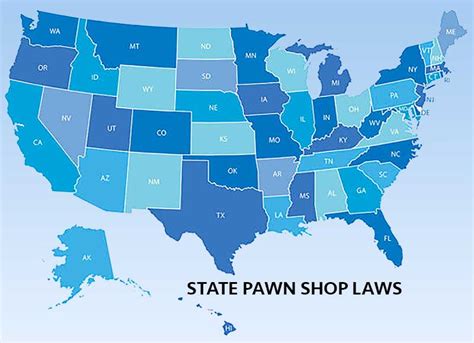Pawn Shop Age Limits: A State-by-State Guide
Pawn shops offer a convenient way to access quick cash or acquire valuable items at discounted prices. However, navigating the legal landscape surrounding pawn shop transactions, particularly age restrictions, can be tricky. This comprehensive guide breaks down the age limits for pawning items and receiving loans in each US state. Understanding these regulations is crucial for both individuals looking to pawn items and those operating within the pawn industry.
Disclaimer: The information provided here is for general guidance only and should not be considered legal advice. State laws are subject to change, and it's always recommended to consult with legal professionals or relevant state authorities for the most up-to-date and accurate information.
The Complexity of Pawn Shop Age Laws
Unlike many retail transactions, there isn't a single, federally mandated age limit for pawning items. Instead, age restrictions are determined at the state level, and even within states, nuances can exist depending on the specific item being pawned or the type of transaction involved. Some states may tie their age limits to general consumer protection laws, while others have specific statutes addressing pawn transactions. This leads to a patchwork of regulations across the country.
State-Specific Age Limits (A Partial List - Check Your State's Laws)
Due to the constantly evolving nature of state laws, providing an exhaustive, perfectly up-to-date list across all 50 states and territories is beyond the scope of a single article. However, we will illustrate the variability and guide you on where to find reliable information for your specific state.
Example States:
-
California: California's laws regarding pawn shops are complex and often depend on the type of transaction. Generally, there's no specific age limit for pawning items, but the individual must be legally able to enter into a contract. This means minors may face restrictions.
-
Texas: Similar to California, Texas doesn't have a specific age restriction in its pawn shop statutes, but the ability to enter into a binding contract is essential. This often implies an 18-year-old minimum age.
-
New York: New York has stricter regulations compared to some states. Minors are generally prohibited from engaging in pawn transactions.
-
Florida: Florida's laws are also quite specific and may require individuals to be 18 or older to engage in certain pawn transactions.
Where to Find Your State's Specific Laws:
The best approach is to research your state's specific laws directly. Reliable sources include:
- Your State's Attorney General's Website: These websites often have consumer protection sections that address pawn shop regulations.
- Your State's Department of Financial Services (or equivalent): These departments usually oversee businesses like pawn shops.
- State Bar Associations: These organizations can provide referrals to attorneys specializing in consumer law who can give you accurate and up-to-date information.
Frequently Asked Questions (FAQ)
What happens if a minor tries to pawn an item?
The consequences vary by state. In some states, the transaction may be deemed void, and the item returned to the minor. In others, penalties could be imposed on both the minor and the pawnbroker.
Are there age limits for redeeming pawned items?
Typically, the age requirement for redeeming a pawned item mirrors the age limit for pawning it. If you weren't old enough to pawn it initially, you may also not be able to redeem it.
Can I pawn an item for someone under the legal age?
Generally, no. You cannot enter into a contract on behalf of a minor. This action could have legal ramifications for you.
What about online pawn shops?
Online pawn shops generally adhere to the age restrictions of the state where the seller and the business operate. The online aspect does not exempt anyone from adhering to state laws.
What documents might a pawn shop require to verify age?
Pawn shops usually request a government-issued photo ID, such as a driver's license or passport, to verify age.
This guide provides a framework for understanding the complexities of pawn shop age limits. Remember to always consult your state's relevant authorities and legal counsel for definitive answers. Navigating the legal landscape surrounding pawn transactions requires careful consideration of your state’s specific laws and regulations.

